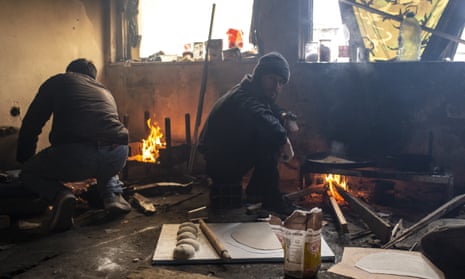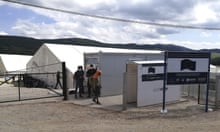Authorities in Bosnia have ordered the transfer of thousands of migrants to a remote camp in Lipa, a village about 25 kilometres from the border with Croatia, due to the coronavirus outbreak in the country.
In a document seen by the Guardian, the Bihać city civil defence headquarters asked that the move be carried out “in order to take urgent measures to prevent the onset of the disease caused by Covid-19”.
The construction of the new camp started a few days ago, prompting panic among asylum seekers and volunteers, who fear the measure will not guarantee any assistance to migrants. There is particular concern over access to water, heat and electricity, as well as a feeling that the move marks a further deterioration in their living conditions.
“The move by [the] authorities to set up a further tent camp in Lipa shows a cyclical regression in the treatment of people-on-the-move in western Bosnia-Herzegovina,” said the Border Violence Monitoring Network, a watchdog organisation that documents abuse against migrants in the Balkans. “With the onset of Covid-19, the internal dispersion of people to a remote tent settlement marks a further stage in the suppression of living conditions and restriction on movement.”
Bosnia’s autonomous Bosniak-Croat Federation declared a state of disaster last week, which will enable it to introduce emergency measures to halt the spread of coronavirus, the region’s prime minister Fadil Novalic has said. There were 185 confirmed cases of Covid-19 in Bosnia-Herzegovina at the time of writing, according to the Johns Hopkins University CSSE coronavirus tracker.
According to the document seen by the Guardian, the authorities have imposed “a complete restriction on the movement of migrants beyond temporary reception facilities”. “It is also forbidden to transport migrants by train, bus, vans, taxis and all other means of transport,” the document states.
The mayor of Bihać, Suhret Fazlic, has told the press that migrants who move around freely in Bihać and other towns could pose a danger as potential carriers of the virus.
The camp is expected to host at least 2,000 people for the time being, and 50 tents are already being set up. Fazlic told the Balkan Insight news-site that “activities are underway to establish a water supply system and a lighting unit”.
According to some sources, migrants will not be able to leave the camp, which will be under surveillance by Bosnian police forces.
An estimated 3,000 migrants are currently living in cramped conditions in abandoned buildings or disused train stations. The heavy snowfall has made conditions intolerable, with thousands of people living without electricity, heat or drinking water.
“Breaking up existing squats and cramping thousands of people (by force) into a large tent settlement has occurred before, but now comes at a time when members of the public are being told to maintain social distancing,” said Border Violence Monitoring. “Instead the decision actively places vulnerable groups into a mass site with inadequate sanitation, no recourse to self-isolation, and a lack of access to institutional medical support.”
Last week, doctors told the Guardian that the Bosnian authorities do not have the ability to contain a possible spread of Covid-19 among migrants. “We don’t have room to place them under quarantine,” said Semra Okanović, a doctor in Velika Kladuša, a town near the Croatian border. “We don’t have enough tests for our population, and we don’t have any for migrants. And we really don’t know if some of them have been infected or not.”
Volunteers fear that Covid-19 will be used as a pretext to strip migrants of their rights. “The biggest concern is that such treatment sits comfortably in line with existent practices, such as mass tent settlements, dispersal from urban centres, disembarkations at entity boundaries, squat evictions and police violence,” said Border Violence Monitoring.
The decision to move migrants to Lipa has sparked a row in the country, with representatives of Serbs, who returned to Bosnia’s Federation entity after fleeing during the war, complaining that the Muslim migrants living in the new tent camp near the village could be “a threat to their livelihoods’’.
The Committee for the Protection of Serb Rights has already filed a criminal complaint Fazlic for advocating the site, Balkan Insight has reported.









